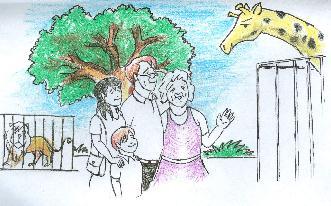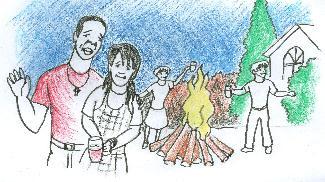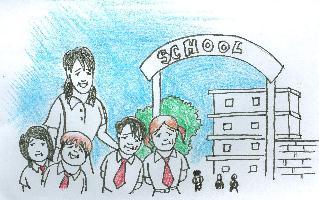Introduction
As we are all aware, English is widely used as a medium of communication between both native speakers and people from different language backgrounds. JSS students need to learn English not just for academic success, but also to help them build better social and workplace relationships. This unit contains strategies to help your students use the appropriate grammatical structures in their social interactions.
Unit outcomes
By the end of this unit, you will:
|
Outcomes |
|
Terminology
|
Terminology |
Language functions: |
The various uses of language. For example, inviting, appreciating, requesting, commanding, offering help, etc. Each of these has certain grammatical and vocabulary choices. |
Structures: |
This is the short expression for grammatical structures or patterns, constructions or simply word classes required for constructing accurate sentences. |
Teacher support information
As an English teacher, you should be aware that different structures are used to express degrees of politeness in English. For example, Could you… is more polite than Can you… when making a request.
In this unit, you must make your students aware of these differences so that they can perform language functions such as accepting and rejecting invitations appropriately. This will help them express themselves better in social interactions, from interactions in the classroom to exchanges outside school.
Case study
|
Case study |
Ms Joan Davis, a JSS English teacher, was very excited about the Teachers’ Day celebrations that the students had organised. There would be no classes that day, and the students had put together a cultural show for all the teachers. Ms Davis was happy for another reason: she had a lot of assignments to mark. She informed the students that she would be in her room marking assignments, and instructed them to call her when they were ready to begin the show. At the appointed time, two senior students came round and announced to her, “Okay, we are ready. Come on.” Ms Davis was both amused and disappointed by their words. She knew they meant well and had simply not realised that their words sounded very impolite. She also knew that the problem was because nobody had taught them about politeness strategies in school. Instead of admonishing them, she decided to think of ways of making them practise grammatical structures for politeness. She drew up a few lesson plans that included exercises to practise language functions such as inviting politely, making a polite request, turning down an offer politely and so on. She discussed them with the principal, who thought they were a great idea, and suggested she invite other teachers to watch, so that they could do the same in their own classes. Over the next two weeks, Ms Davis held a series of interesting sessions in which students used role play and other techniques to practise conversations using polite forms. Later, other teachers worked with their own students, and by the end of the year, Ms Davis was pleased to see the students interacting more politely in English with teachers, parents, guardians and visitors. |
|
Points to ponder |
|
Activities
Activity 1: Using modals for polite requests
|
Activity 1 |
This activity is designed to make students aware that English requests can be made more (or less) polite by using different modal verbs, or changing the tense of a modal verb. Because the students will practise functional grammar (the structures necessary to perform language functions) in this activity, they need to use these structures themselves. The first step is to test their existing knowledge about requests in English. On slips of paper, write a situation where a request would be required (asking for a glass of water, borrowing a pen, running an errand, etc.). Put the students into groups of four or five, ask them to pick a slip of paper and have them use the phrase on it to write a request. In the feedback session, use their responses to collect a sample of different structures (Please give me a glass of water/Can I borrow your pen? etc.). Put these on the board (correcting any grammatical mistakes). Next, show the students these structures in appropriate contexts. For this, distribute the exercise in Resource 1a to each group and tell them to complete the dialogue using expressions from the list on the board. Each group can then do a role play with their dialogue. Once the students have practised using some expressions for polite requests, they can learn to differentiate sentences according to the degree of politeness. Give them the requests in the short exchanges listed in Resource 1b and ask them, in their groups, to grade them according to which request they think is more polite. Point out that requests can be made by using the polite form of modal verbs. For example: Could you bring me a pen, please? Would you mind closing the door, please? are more polite than Can you bring me a pen, please?/Please bring me a pen. Can you close the door, please?/Please close the door. |
Activity 2: Accepting and declining invitations: Using contracted forms
|
Activity 2 |
The language used in the classroom is usually restricted to questions, answers and discussions related to the lesson — the story, poem, play or essay — that students are expected to read. As a result, students end up learning to speak in a formal way. In fact, we actually discourage students from replying in half sentences or with a simple Yes/No and instruct them to “speak in full sentences.” As students will need to use English in “real life” after they leave school, we need to help them learn and use the grammatical forms of oral communication. One such grammatical form is contracted forms (of modal verbs and not), such as isn’t, can’t, wouldn’t, I’ll and so on, which we frequently use in oral communication situations. A real-life situation in which these structures are used is accepting and declining invitations. This activity is therefore intended to give students practice in using contracted forms appropriately when dealing with invitations. First, you should find out how familiar your students are with informal/ oral language expressions. For this you will need to provide them with samples of language used for different functions such as invitations, requests, apologies and so on. Divide the students into small groups and ask them to match a set of situations (below) with their corresponding spoken invitations played out on audio/video (see Resource 2 for samples). This will test their existing knowledge of language functions, and motivate them as they embark on their task. Remember not to give them the answers as they listen/watch! Situations: Agreeing, congratulating, apologising, disagreeing, requesting To extend the task one step further, you can give the students a jigsaw puzzle task on invitations. Prepare a set of expressions (or use the samples given in Resource 3) that include comments from different exchanges on invitations. The students’ task is to rearrange the pieces to make meaningful conversation exchanges. After they have finished, play the video/audio in Resource 3a and let them check if they put the sentences in the correct sequence. To add some complexity to the task, you could add some formal expressions (that contain full sentences instead of utterances with contracted forms) so that they have to do two tasks: select the appropriate expressions and rearrange them. After the students have finished the task, play the audio/video version in Resource 3b and allow them to correct their versions if necessary. To make the students focus on the grammar point, give them conversation cards on which the exchanges have been written in two formats: one with the contracted forms and the other with the more formal sentences. Pick out one sentence from each comparable conversation exchange and put them on the board. For example: 1a I’m not sure I’ll be able to attend. 1b I am not sure I will be able to attend. Draw their attention to the structural differences: ask them what is different, and have them notice that both (1a and 1b) are correct, but that 1a is more appropriate as it sounds more natural. Highlight the fact that in natural conversations people use short cuts such as contracted forms, do not repeat entire questions when responding, and add expressions such as thank you, I’m sorry, I’m afraid and so on to sound more polite. Now that the students have had some practice with these structures, ask for volunteers to do role plays based on the exchanges. They can watch the videos or listen to the audios of the same conversations for rehearsal, and then act out the situations. Make sure that they use the contracted forms they encountered in the tasks. The role play will not only give them confidence, it will also help them practise using the grammatical forms in a natural context. A few more examples of language functions are given in Resource 4. |
Activity 3: Giving a description: Subject and object relative clauses
|
Activity 3 |
In social situations, we often find ourselves introducing people to one another, referring to past events, or describing things, other people or events. One strategy we use to refer to or describe things, events and people is called relativisation — that is, showing the relationship of one thing to another. In this activity, students will engage in an activity that will help them practise relative clauses, clauses that begin with a relative pronoun such as who, which or that. This activity has two parts. In the first part, the students see a set of pictures of people and places, and then have to complete a narrative (a story) using the relative clauses that they hear you use to describe the pictures. In the second part, the students have to guess and complete the storyline using relative clauses. For the first part, you can either use the storyline given in Resource 5, or narrate an event familiar to you with pictures related to it. The students complete the activity only after they have gone through the discussion and had some practice in the use of relative clauses. For the activity:
|
Unit summary
|
Summary |
In this unit we looked at how social activities use specific language functions, and what grammatical structures (formal and informal) are appropriate for use in these social activities. As English is increasingly being used for interaction in official as well as social settings, students need the skills to communicate effectively in different contexts, such as formal (interview boards, academic presentations), semi-formal (group discussions, class debates) and informal (parties, hotels, exhibitions) situations. It is important to remember here that students can gain confidence in using English effortlessly only when they listen to authentic samples of language used, and practise using the appropriate forms themselves. In this unit, therefore, the students need enough opportunities to use the various language functions in the classroom with their peers. Participatory techniques such as pair and group work, role play and discussion serve two purposes: they allow students to feel less self-conscious, and help the teacher to involve the whole class in meaningful language activities. |
Reflections
|
Reflection |
|
Assessment
|
Assessment |
|
Resources
Resource 1a: Modals for polite requests
|
Resource 1a |
Here is a conversation between two classmates, Mike and Sally, who have been asked to work together on a class project. In the conversation you will find them making requests for things they need to work on a clay model of the Earth. Discuss and complete the dialogue with your group. Remember to make the dialogue sound like real conversation. Also remember to make the requests very polite. When you are ready, choose two people to act out the conversation before the class. |
||
|
|
Sally: |
Hi, Mike. I’m so happy we’re working on this project together! I just loved your model of the Moon last term! |
|
|
|
Mike: |
I’m glad we’re a team, Sally. I think we’ll have a great time together working on this. Can I sit down here? |
|
|
|
Sally: |
Of course! Could you pass me my bag, please? I’d like to show you something. It’s a step-by-step process for making clay models that I found on the Internet. |
|
|
|
Mike: |
Sounds interesting! I’ve got a few ideas myself… |
|
|
|
Sally: |
Okay, then shall we do it like this? We can discuss our ideas first, and then see if the instructions for the model I’ve got will help us. |
|
|
|
Mike: |
All right. But please give me a copy of your paper on the model — I’d like to look at it carefully at home tonight. |
|
|
|
Sally: |
Sure! Just remind me after school today. |
|
|
|
Mike: |
|
|
|
|
Sally: |
|
|
|
|
Mike: |
|
|
|
|
Sally: |
|
|
|
|
Mike: |
|
|
|
|
Sally: |
|
|
|
|
Mike: |
|
|
|
|
Sally: |
|
|
|
|
Mike: |
|
|
Resource 1b: Degrees of politeness
|
Resource 1b |
Look at the expressions below. They are all polite requests, but one of each pair is more polite than the other. Discuss with a partner and say which sentence is more polite.
|
Resource 2a: Language functions: Contracted forms
|
Resource 2a |
Transcripts Invitations Jenny: Hi, Jeremy! Long time, huh? What brings you here? Jeremy: How have you been, Jenny? You’re right... it’s really been a long time since we got together! Which is precisely why I’m here. You remember Susan from our tennis club? Jenny: Susan White? What about her? Jeremy: Well... Susan and I got engaged last week, and we’re organising a small get-together for our old friends on Christmas Eve. Jenny: That’s wonderful! Just tell me the time and place, and I’ll be there! Requests Jeremy: Uh, Jenny... could you do me a favour, please? Jenny: Of course... as long as you’re not going to borrow money from me! Jeremy: Oh no, it’s nothing like that! I was wondering if you could help me choose a wedding ring for Susan... Jenny: Are you sure Susan would like that? Jeremy: Well, it was HER idea in the first place! Apologies Jenny: Uh, Jeremy, do you have a minute? I’m afraid it’s important! Jeremy: Sure, Jenny. What is it? Jenny: It’s a little bit embarrassing, but there’s something I need to tell you right now. Jeremy: Go on... Jenny: I’m afraid I made a big mistake. I blurted out to Susan that you failed your A-levels the first time. I… I’m truly sorry. I didn’t mean to let it slip... it just came out when we were remembering our exam experience in Mr Smith’s classes... I just hope this doesn’t become an issue between the two of you... I’ll never forgive myself if Susan thinks you deliberately kept it from her... Congratulating Jenny: Susan, Jeremy... I’m SO happy for you two! Congratulations! You make a great couple! This is really a fairy tale wedding, isn’t it? SO where are you guys heading off for your honeymoon? Susan/Jeremy: Thanks, Jenny! Susan: We’re sailing down the Nile next week. We’ll leave for Africa tonight and tour a bit of the Northern countries first! Jenny: Wow! That’s wonderful! Best wishes for your honeymoon, too, then! Jeremy: Thanks, Jenny... You’re a dear! Disagreeing Jenny: By the way, Susan, I think you should wear pink more often — baby pink — that’s YOUR colour! Susan: Oh no, Jenny! I HATE pink! Especially baby pink! Nobody takes me seriously when I’m in pink! It’s as if people refuse to believe I’ve grown up! Jenny: I certainly don’t agree! I think you look innocent, not childish in pink! And with your brown curls, you really look like an angel! Susan: You’re wrong, Jenny! I don’t look like an angel — I look like an angel’s assistant in pink — all brown curls, brown eyes and dainty pink! In fact, Jeremy teases me no end about my pink bedroom slippers! Jenny: I’m afraid I still think you look great in pink, Susan, and if Jeremy doesn’t think so he’s a fool! |
|
Video |
Resource files
See in the enclosed DVD a video recording of the activities:
|
|
Audio |
If you have trouble playing the video, you can have your students listen to the audio recording (below) of the same conversation:
|
Resource 2b: Matching task on invitations
|
Resource 2b |
Invitation to... |
Text of invitation |
|
River cruise |
I would like to invite you and your family to my son’s wedding reception on Sunday, 26 December, at the Mayfair Hotel. The reception is at 9:00 p.m., and will be followed by a fireworks show at the riverside. |
|
|
Dinner |
Hey, guys, how about the four of us meeting in the cafeteria at noon tomorrow? It’s been ages since we met, and I really need to share my good news with you! |
|
|
Broadway play |
Linda, are you free this Friday evening? I thought it would be nice to take the evening cruise down the Thames together! |
|
|
|
Wedding |
Jenny, I’ve got two tickets for Broadway next Saturday. Vampire’s Boots is playing and I’d love to watch it with you. |
|
|
Share good news |
We’d be delighted to have your and Lincoln’s company at dinner at our bungalow tomorrow night. Please join us for cocktails at 8:00 p.m. |
Resource 3a: Jigsaw puzzle task
|
Resource 3a |
Here are comments from a conversation about an invitation. The conversation is between two friends, Jeremy and Richard. Jeremy is inviting Richard to a party. Arrange the comments in the form of a conversation, with Jeremy and Richard speaking in turns. After you have finished, your teacher will play the audio tape for you. Do you have the comments in the correct order?
Here’s the beginning of the conversation: Jeremy: I’m arranging a small party for a group of close friends this weekend. _______________? Richard: I’m not sure. _______________! |
Resource 3b: Jigsaw task on invitations (informal version)
|
Resource 3b
|
Transcript Jeremy: Hey Richard. Richard: Hey Jeremy. Jeremy: I’m having a party for the old gang this weekend. Will you be in town then? Richard: I’m not sure. I’ve been invited to a play by my boss, and you know bosses — they don’t like being stood up! Jeremy: True... Richard: The truth is, though, I’d love to squeeze out of it. Let me see if I can find someone to stand in for me... Maybe I can cook up some excuse and wriggle out of it. Jeremy: DO try. It’ll be a shame to catch up on old times without you — everyone will be really mad if you can’t make it! Richard: I’ll try, I WILL! Jeremy: And guess what? Blake and Robert are also around. Haven’t we been planning this for years now? We never seem to be able to get the gang together! Richard: I’m SO tempted... I wonder if I can get my colleague Sheila to take Mr Gower to the play. She’s wonderful company, and quite attractive. I’m sure the boss won’t mind the least bit! Jeremy: Okay, you do that. And be at my place at eight sharp! |
|
Video |
Resource files
See in the enclosed DVD a video recording of the activity:
|
|
Audio |
If you have trouble playing the video, you can have your students listen to the audio recording (below) of the same conversation:
|
Resource 3c: Jigsaw task on invitations (formal version)
|
Resource 3c |
Jeremy: Hey Richard. Richard: Hey Jeremy. Jeremy: I am arranging a small party for a group of close friends this weekend. Will you be in town then? Richard: I am not sure I will be able to attend. I have been invited to a play by my boss, and you know bosses — they do not like to be disappointed. Jeremy: True… Richard: However, I would love to excuse myself from it. Let me see if I can find someone to take my place... Maybe I can think of a good excuse to back out of the programme. Jeremy: DO try to be there. It will be a shame to catch up on old times without you — everyone will be really disappointed if you cannot make it! Richard: I will try, I WILL! Jeremy: And guess what? Blake and Robert are also here. Have we not been planning this meeting for years now? We never seem to be able to get the whole group together! Richard: I am SO tempted to attend the party... I wonder if I can convince my colleague Sheila to take Mr Gower to the play. She is wonderful company, and quite an attractive person. I am sure the boss will not be disappointed. Jeremy: Okay, please do that. And do be at my place at 8:00 p.m. positively. |
|
Video |
Resource files
See in the enclosed DVD a video recording of the activity:
|
|
Audio |
If you have trouble playing the video, you can have your students listen to the audio recording (below) of the same conversation:
|
Resource 4: Additional information on language functions
|
Resource 4 |
Functions
|
Resource 5: Giving a description: Relative clauses
|
Resource 5 |
Part 1 Jennifer Stewart spent a month in our city living with a family as part of a students’ exchange programme. Here are some moments of her stay that she captured on camera. Let’s find out what she thinks of our city and its people. This is a photo of….
… the family with whom I stayed.
….the place they took me to visit one weekend.
…the other foreign visitor whom I met at a party.
…the school that I went to for three weeks.
…the church that was built 300 years ago.
…the boy who lived in the flat opposite.
(Artist: Ashutosh Borthakur, Department of Linguistics, Gauhati University.) Now let’s read what she said about our city in an email she sent recently. Fill in the gaps in her story with the information from the photos above. The clauses she has used are called relative clauses, and she uses them to refer to the people and places she wants to describe. Description: I had a wonderful time in your city, and I especially liked ___________, because they treated me like their own daughter. I made friends with ___________, and they took me out every weekend, except one. On the last weekend, my hosts took me sightseeing. The place___________ was just a two-hour drive away, but it was such a refreshing change from the hustle and bustle of the city! During the weekdays I had to study, and ___________ allowed me to borrow as many books I wanted from its library. But it’s not that I got bored with such a hectic schedule; I had a good time learning about the city and its history. And I was not the only strange face in this school. I became friends with an American guy, _________. The party where I met this guy was a traditional affair, and it was interesting to join people in singing and dancing around the bonfire. I really enjoyed my time here, and I will always cherish the time I spent here with you. |
Teacher question and answer
|
Feedback |
Question: How do I engage my students in these communicative activities without disturbing the neighbouring classes? Answer: It might help if you discuss your plans with your colleagues and ask for their co-operation. You could warn them about the possibility of extra noise, and apologise beforehand. You should also ask for your students’ co-operation, and make them understand that they have a responsibility to keep the noise level low. Students usually respond well when teachers make them feel they are part of a “grand plan,” so you could make them treat these classes as a special experience. It might also be a good idea to discuss this issue with your principal so that you have his or her support. |
 |
 |
 |







